Earnings and spending money have been an integral part of our lives for a long time. Today, economics lies at the heart of human society and plays the de-facto role of carrying the world ahead. In this era of modern economic establishments, it’s impossible to even think of moving on with life without spending currencies. So, planning our spending is of extreme importance.
Accounting and financial software are computer programs that enable us, mere humans, to keep track of our earnings and spending effectively. As Linux is a significant player in the computing world, a massive number of compelling Finance Software for Linux exist. Additionally, a plethora of powerful Linux Accounting Software guarantees corporations and small businesses won’t have to worry about their financial outcomes.
Best Accounting and Finance Software for Linux
There are many different Linux Accounting Software programs available for different types of commercial jobs. Due to the many variations, people often get confused when choosing the best Finance Software for Linux.
Our editors haven’t overlooked this issue and curated this guide to help you identify the best Linux personal finance software to meet your daily financial demands.
1. GnuCash
The pinnacle of open source personal finance software, GnuCash, is, without any doubt, the best of the trade. This mesmerizing finance software has been around for over 20 years and continues to be a viable accounting solution for Linux enthusiasts. GnuCash has also been proven to be sufficient for managing the financial needs of small to medium businesses.
Features of GnuCash
- GnuCash features a powerful general ledger and enables double-entry accounting out of the box.
- It is free to use and boasts a GNU GPL license, allowing open-source devs to modify the software as required.
- Tracking stock prices is straightforward in GnuCash, and users can stay updated with the ever-changing market anywhere, anytime.
- GnuCash supports multiple currencies and features powerful payroll management functionality for business owners.
2. HomeBank
HomeBank is another compelling Linux personal finance management software that features an extensive collection of functionalities to keep track of your monetary transactions effectively. It is straightforward to use, and even people with little or no previous accounting knowledge can use HomeBank without any problem. Plus, HomeBank has been tested on several Linux distributions and is reported to run efficiently on most systems.
Features of HomeBank
- Users can import their financial documents into HomeBank from Quicken, Microsoft Money, or other standard formats.
- HomeBank implements powerful mechanisms to detect duplicate transactions and allows dynamic transaction filters.
- This finance software for Linux is based on GTK2 and features a simple yet elegant user interface.
- HomeBank supports multi-accounts, annual budget planning, automated pre-defined transactions, visual paying mode, and robust financial analysis with graphical charts.
3. KMyMoney
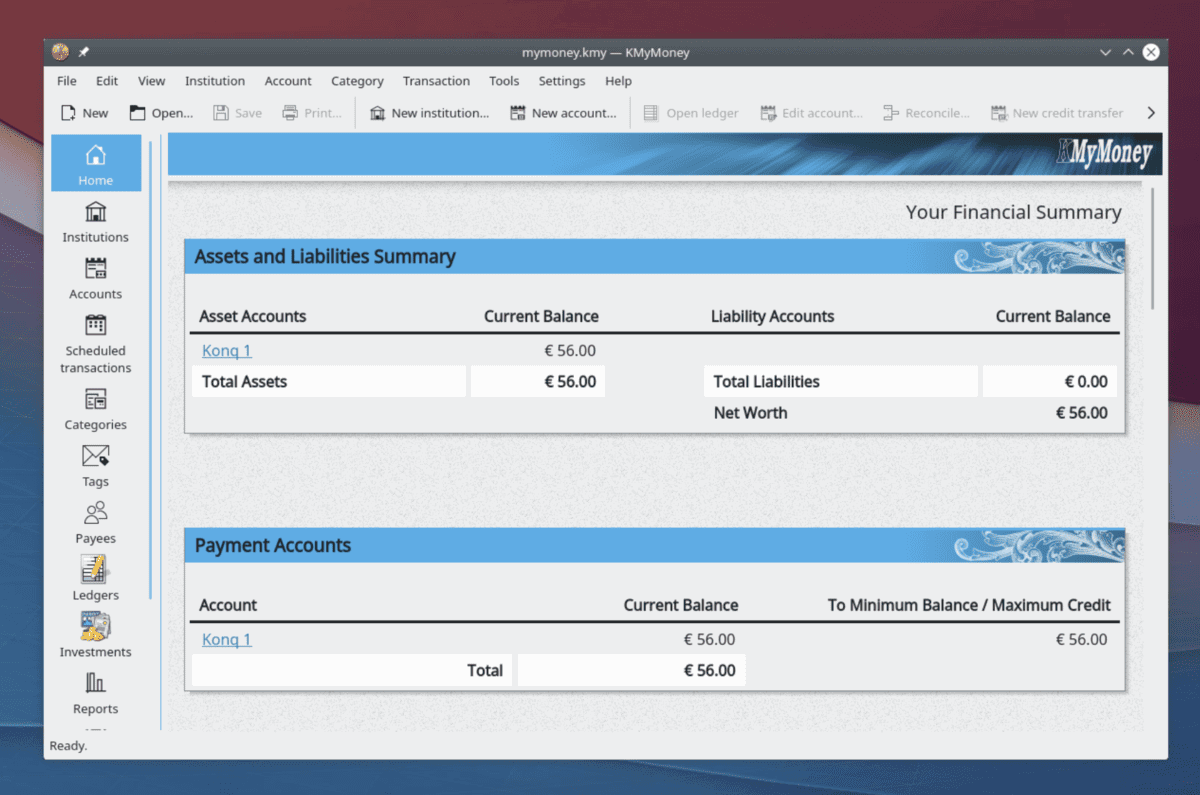
KMyMoney is a great personal finance manager for KDE users. It provides greater importance to ease of use, efficiency, reliability, and security. This finance software for Linux is similar to MS Money and Quicken and supports a lot of heavy-duty features to make managing personal transactions easy and efficient.
Features of KMyMoney
- It supports the essential management of personal investments like stocks, bonds, and mutual funds and keeps their prices up to date.
- KMyMoney has built-in support for over 170 currencies and value-added tax (VAT) support.
- This finance software implements powerful GPG encryption schemes to keep sensitive financial documents sound and secure.
- KMyMoney supports double-entry accounting and lets users effectively keep track of their daily and annual transactions.
4. FreshBooks
FreshBooks is arguably one of the best Accounting Software programs. It features a plethora of robust accounting functionalities to help business owners manage complex commercial transactions. It is easy to use yet makes managing business payments effortless. If you’re a small business owner looking for powerful Linux finance software for your corporation, FreshBooks might be the perfect solution for your commercial needs.
Features of FreshBooks
- This finance software for Linux features a ridiculously simple-to-use interface that is simultaneously powerful and intuitive.
- FreshBooks automates everyday financial tasks such as invoicing, organizing expenses, tracking time, etc.
- Users can access this accounting software from many different platforms, including desktop, smartphone, tablet devices, and even the cloud.
- The effective time-tracking mechanism of FreshBooks allows users to make the most out of their business hours.
5. Moneydance
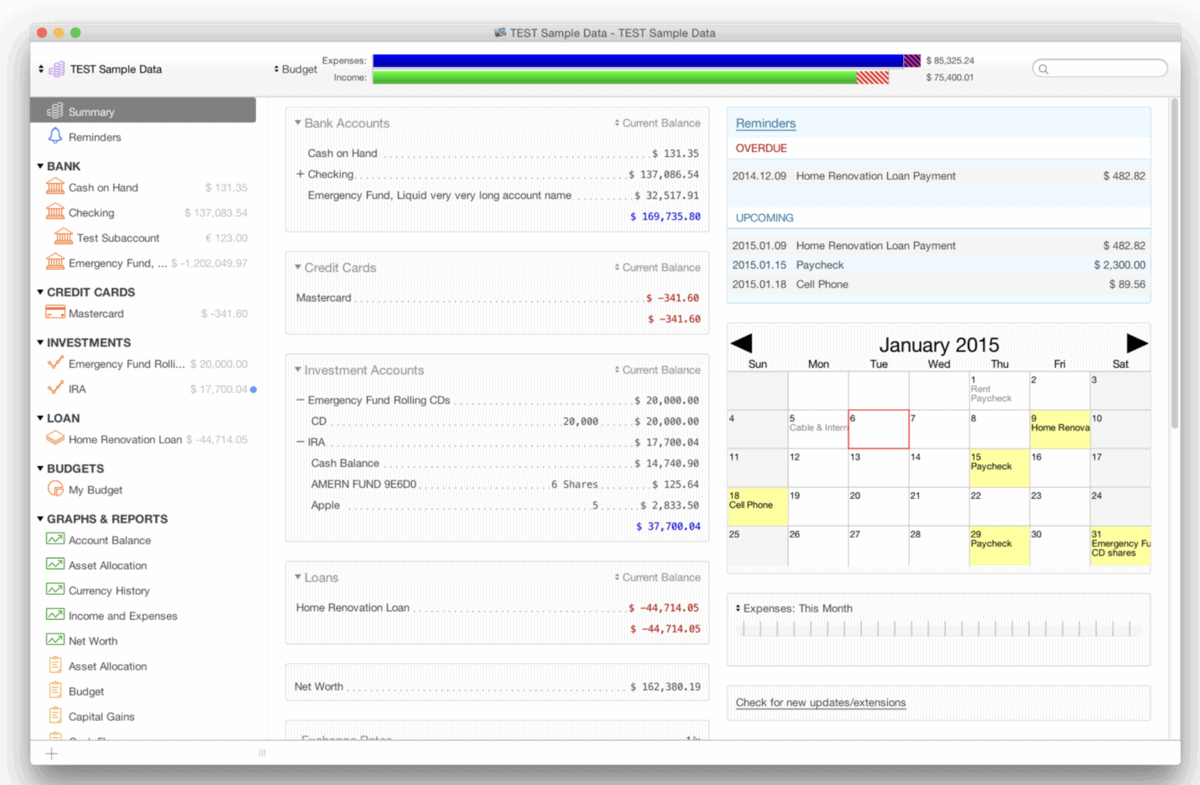
Moneydance is a mesmerizing Linux personal finance software featuring lots of great functionalities for making monetary transactions easy and effortless. Although proprietary, Moneydance has earned the trust of its customers, and it keeps telling others to get it to manage their personal accounts effectively.
This easy-to-use Linux accounting software allows users to utilize online banking, analyze spending with graphs and charts, and keep track of private investments hassle-free.
Features of Moneydance
- Moneydance provides a robust summarization of your financial transactions, including account balances, upcoming transactions, payment reminders, and foreign exchange rates.
- This Finance software’s powerful investment tracking mechanism for Linux lets users effortlessly keep track of their stocks, bonds, deposit certifications, and mutual funds.
- Moneydance offers a brilliant mobile app to help customers maintain their monetary schedules even on the go.
6. Buddi
If you’re a new business owner with little or zero previous exposure to business management or economics, Buddi is an excellent choice for your personal finance software. Designed to be as easy as possible, Buddi combines a substantial number of powerful accounting features with a simple-to-use yet effective user interface. This open-source personal finance management software is cross-platform and offers superior performance at zero cost.
Features of Buddi
- Buddi is simple to use and lightweight, allowing it to run smoothly on even older Linux machines.
- The user interface of this finance software for Linux is neat and straightforward. Its powerful navigational capabilities enable users to maximize their productivity.
- A wide array of powerful third-party plugins makes it easier to add functionalities as user requirements increase.
7. Grisbi
Grisbi is one of the best open source personal finance software for Linux systems. It sports a massive list of robust functionalities right out of the box and integrates a simple-to-use yet elegant user interface on top of them. Grisbi makes it very simple to manage multiple accounts, currencies, and users and import financial documents directly from QIF, OFX, and Gnucash.
Features of Grisbi
- The GUI interface is simple yet provides an excellent look into the features.
- Grisbi lets users print their financial documents, like payment statements, using LaTeX or export them via HTML.
- It is possible to schedule future transactions easily with this finance software for Linux.
- The open source licensing allows Grisbi to be modified or extended as users require.
8. Money Manager Ex
Money Manager Ex is a powerful solution for people who are browsing personal finance software for Linux. It equips a large number of helpful features to make sure users don’t get caught up in financial messes and leaves no stone unturned when it comes to performance. This cross-platform financial manager is the perfect choice for users who want powerful yet flexible Linux personal finance software.
Features of Money Manager Ex
- Money Manager Ex offers a robust mobile app to supplement its desktop software, which is useful to keep track of your spending while on the go.
- The financial data is encrypted with the AES encryption mechanism to ensure data safety.
- Users can install this personal finance manager directly from their removable USB devices.
- Money Manager Ex ships with an open-source license, allowing users to modify or customize the software to fit their commercial needs.
9. Skrooge
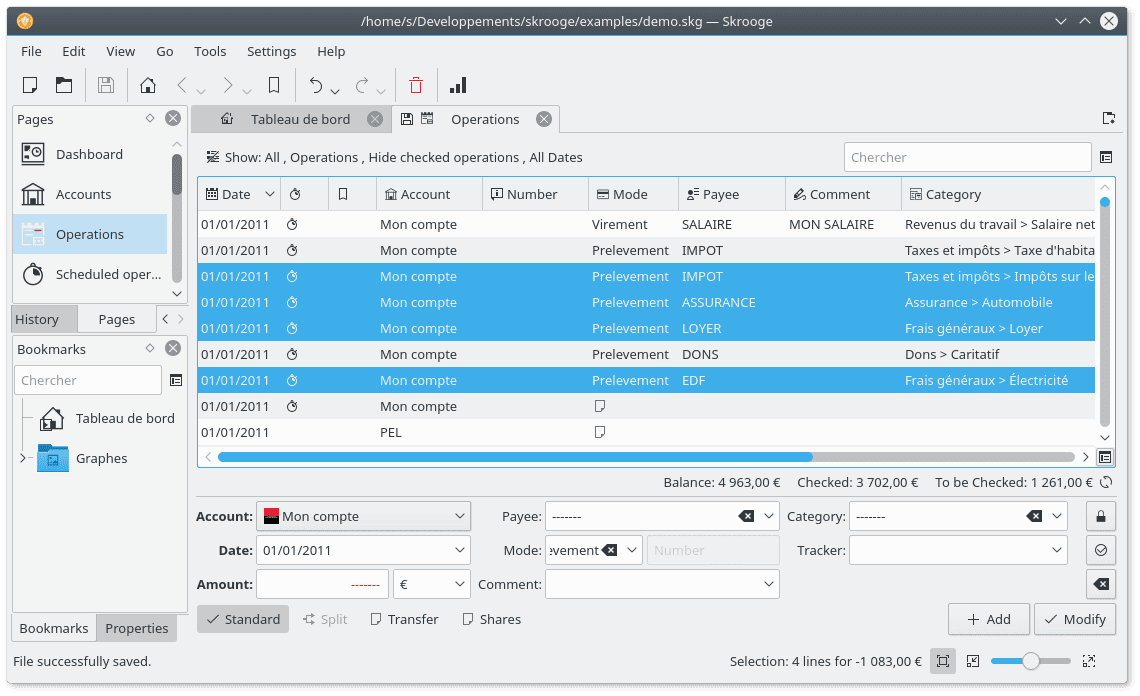
Skrooge is excellent accounting software that makes managing personal finance data a breeze. This KDE-powered personal finance manager sports a large number of powerful features that allow users to keep up with the ever-growing complexity of financial management. Skrooge is tested on a variety of Linux machines and is guaranteed to run effectively on different Linux and BSD distributions.
Features of Skrooge
- Skrooge lets users import financial data from many sources, including KMyMoney, Microsoft Money, GnuCash, Grisbi, HomeBank, and Money Manager Ex.
- Thanks to its robust reporting tools, users can build quick graphs and charts to analyze their earnings and spending effectively.
- Skrooge enables users to budget their future transactions effectively and maintain them without restrictions.
- Users can manage multiple payees and pay in various currencies effortlessly in this Linux accounting software.
10. KashFLow
KashFLow is an awe-inspiring Linux accounting software that’s entirely based on the web and equips users with a plethora of financial management capabilities. It is primarily an excellent choice for people who run small and medium-sized businesses. This cloud-based finance software for Linux offers every possible feature you could ask from a top-notch financial manager.
Features of KashFLow
- KashFLow is based on the cloud and allows users to access it from anywhere on the planet.
- Users can create fast invoices and email them to clients directly using this finance software for Linux.
- Managing payrolls and payees is very easy with this enigmatic Linux accounting software.
- KashFLow lets users fill their tax reports efficiently and allows them to share their financial data directly with accountants.
11. jGnash
jGnash is a fantastic personal finance management software that sports a lot of premium features that are found only in commercial applications. jGnash is developed to make your personal finance tracking effortless and offers advanced functionalities that make it a suitable choice for business people. Although minimal in design, the user interface of jGnash is quite beginner-friendly and presents the available operations in a practical manner.
Features of jGnash
- jGnash has built-in support for double-entry accounting while only allowing the addition of single-entry transactions.
- This finance software for Linux calculates the transactions precisely, without any rounding errors.
- Multiple fee entries, accounts, and currencies are used to track personal investments effectively.
- Financial data can be imported in several formats, including but not limited to QIF, OFX, and QFX.
- Enhancing functionalities by scripting in either BeanShell or JavaScript is possible.
12. SQL-Ledger
If you’re a small business owner looking for modern Linux accounting software for your business, SQL-Ledger is a pretty smart choice for you. This powerful finance manager is web-based and aims to make your economic management as optimal as possible. SQL-Ledger employs a powerful double-entry accounting mechanism that allows users to keep track of their business data without any hassle.
Features of SQL-Ledger
- The financial data of each account are saved in SQL databases on the web, and standard web browsers can be used to access or manage them.
- Users can customize their database and personal preferences by modifying the configuration files.
- The Perl programming language implements the user interface to the PostgreSQL database.
- Users can import financial data directly from CSV files and create emergency backups.
13. Bookyt
Bookyt is simple yet high-performing Linux accounting software for everyday users. It utilizes Ruby On Rails under the hood and combines power with usability to take care of your financial needs. Bookyt comes with features similar to many premium finance software for Linux and can be used to run small to medium-sized businesses without any problem.
Features of Bookyt
- Bookyt has built-in support for a double-entry accounting system and robust due reminder facilities.
- Users can easily customize their business accounts and add debit and credit invoices.
- The open-source nature of its development ensures third-party developers can modify or extend this Linux finance software without any hassle.
- Bookyt lets users set up tax tables and employee expense vouchers very quickly.
14. CGram Software
CGram Software is an award-winning Linux accounting software that has been in the market for quite some time. It allows people who run small—to medium-sized businesses to maintain their financial documents with ease and plan their income and expenditures for the future. If you’re looking for trusted Linux finance software that offers full-fledged functionalities, CGram Software should be on your wishlist.
Features of CGram Software
- It offers full-fledged features to help owners manage their business expenses with ease.
- Users can interconnect every single component of their business with one another.
- CGram Software is flexible and can evolve as your business grows.
- The robust reporting features allow owners to stay on track with their business costs.
15. NolaPro (Paid)
NolaPro is fantastic Linux accounting software based on cloud technology that offers powerful finance management capabilities for average Linux users. Although proprietary in nature, NolaPro is widely advertised by its users due to its incredible power and flexibility. If you want the best finance software for Linux and are ready to pay for it, NolaPro is undoubtedly worth looking at.
Features of NolaPro
- NolaPro sports an incredibly powerful general ledger with double-entry bookkeeping features.
- This finance management software lets Users organize and maintain their payables very quickly.
- NolaPro implements industry-standard security measures to ensure the safety of your financial data.
- Users can customize their modules once they buy the pro license.
16. Quasar Accounting
If you’re willing to part away with some money to get hold of an extremely powerful Linux accounting software, Quasar Accounting might prove to be a pretty great option for you. This innovative modern-day accounting software provides a full-fledged feature list that can take care of virtually any financial requirements your business might have.
Features of Quasar Accounting
- The user interface of this Linux finance software is visually outstanding and intuitive.
- Users can gain access to the full source code upon buying the license.
- Creating backups of your financial data with this accounting software is straightforward.
- It is very easy to add financial data to its intuitive journal.
17. LedgerSMB
LedgerSMB is an accounting software that offers user-friendly features such as double-entry bookkeeping, data integrity controls, community support, high-quality documentation, and more. It is a fork of the popular SQL-Ledger project, and its main objective is to help users manage their financial issues with precision.
Features of LedgerSMB
- It utilizes a standard web browser as its client and stores financial data in SQL databases.
- LedgerSMB uses the Perl programming language to access its database and process financial information.
- It implements robust security measures to ensure the integrity of sensitive financial data.
- The open development model adopted by LedgerSMB allows third-party devs to contribute to the project hassle-free.
18. Eqonomize!
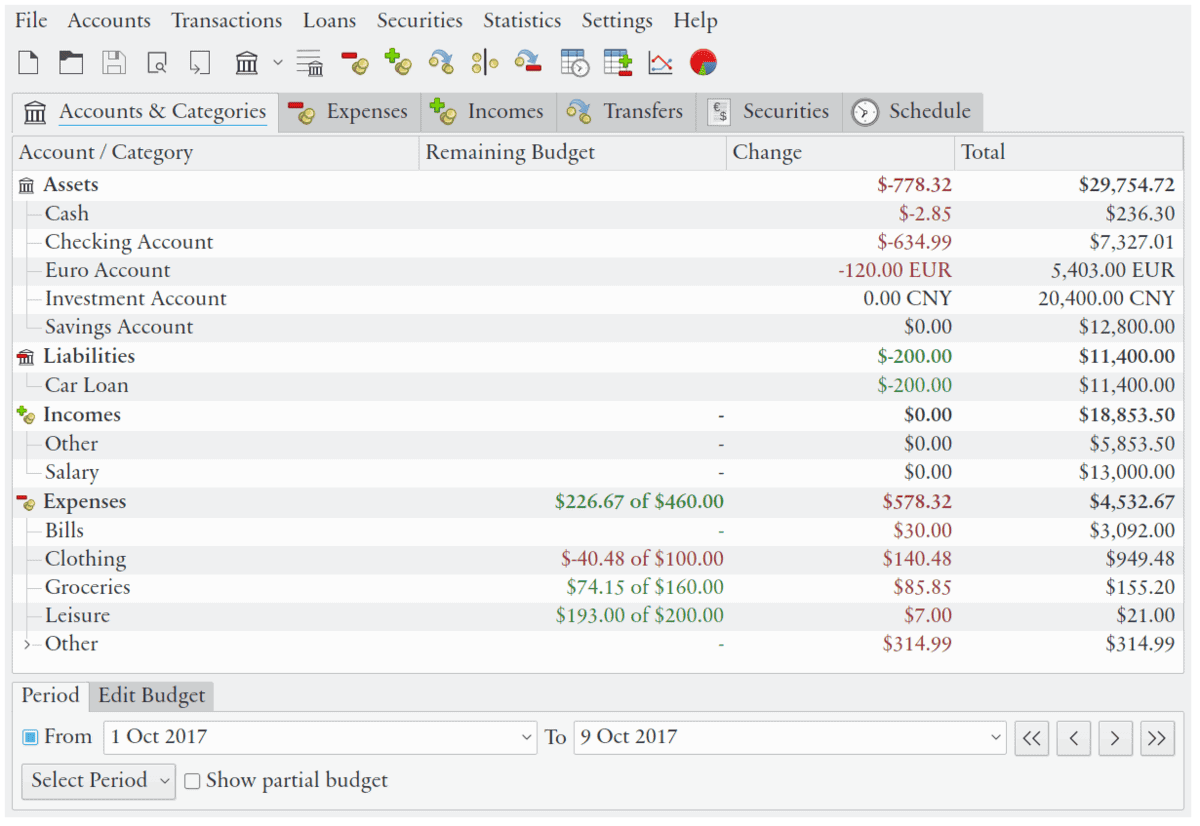
Eqonomize! is a compelling Linux personal finance software built exclusively for users of the KDE environment. It equips a lot of user-friendly features to help home users manage their financial data effortlessly. This modern-day Linux finance software aims at efficiency rather than stuffing features and is quite successful in doing so.
Features of Eqonomize!
- It allows for double-entry bookkeeping, split transactions, refunds, and repayments, among its core features.
- It implements powerful analysis mechanisms to estimate future value and profit based on changes in previous quotations.
- Utilizing flexible and dynamic charts makes this application suitable for visual analysis.
19. Rapid Analysis for Investment Decisions
People who deal exclusively in the stock market and need to follow different stock portfolios on a regular basis will appreciate this finance software for Linux very much. Rapid is a compelling graphing software for Linux that helps business people analyze their financial data and stocks with utmost precision. It’s simple to use this innovative software and requires no hidden charges.
Features of Rapid
- Rapid allows users to stay updated with the most recent stock market information.
- It offers candlesticks, OBV, volatility, Macd, RSI, stochastics, trendlines, and wilder DMI among its technical tools.
- Users can import text data sources and utilize multiple journals to store their financial data.
20. PhreeBooks (deprecated)
PhreeBooks is one of the best Linux accounting software that comes with multiple user-friendly features to help you manage your finances more effectively. This robust Linux finance software is based entirely on the web and is specially curated for running small businesses. If you’re looking for an open source financial solution for your Linux systems, PhreeBooks is, without any doubt, a great choice.
Features of PhreeBooks
- PhreeBooks is entirely web-based and offers feasible solutions for managing the financial difficulties of small businesses.
- It is written in the PHP programming language and utilizes MySQL to store financial data.
- This fully extensible financial management tool supports double-entry accounting, among other ERP functionalities.
- It utilizes the EasyUI graphical interface, which is optimized heavily for mobile and tablet devices.
Ending Thoughts
When choosing the best finance software for Linux, your requirements should be the first and foremost priority. Since different types of Linux finance software exist, you’ll need thorough knowledge to get the perfect Linux accounting software for your business.
Hopefully, we were able to provide you with the essential information required for your venture. Stay with us for more informative guides on Linux and other exciting open-source tutorials.
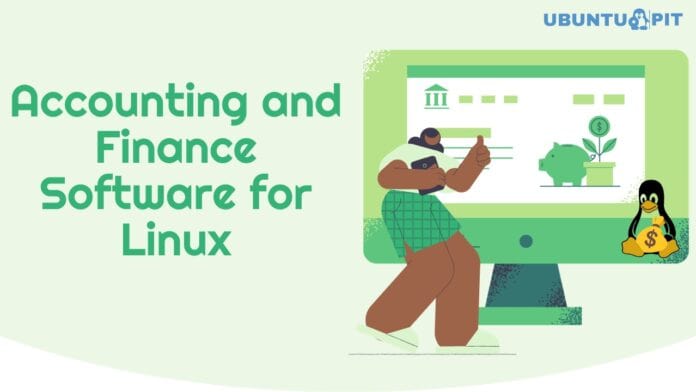
Also missing are all the “plain text accounting” softwares such as ledger, hledger and the like: These are very Linux-ey in the way they work (plain text, after all), and I’m surprised they’re missing here.
Gnucash works well but, If you are moving over from a Windows system to Linux be prepared to find out the hard way that there is no real “backup” of your data. If you want to migrate your Gnucash accounts to another computer… I don’t think so…. unless you’re a dedicated Linux user that knows the in’s and out’s of the flavor Linux you happen to have chosen. I love Linux but you can get as many answers for how to do things as there are Linux users. If you go to forums you will read through long threads and find out that the answers someone is recommending actually doesn’t work on the particular version of the flavor of Linux you chose. If someone has found an easy way to backup Gnucash they haven’t posted it where I can find it.
Your Gnucash save file contains all your data – accounts, transactions, history, etc. Just copy that to any machine and open it with Gnucash. Consequently, you are not limited to one set of accounts – use as many independent sets as you like. For example, if you have a shared computer, just save your data to a flash drive and carry it with you. In addition, Gnucash makes backups for every save in the same directory as your original file, so you can always back out any big errors, that you may make.
Nice list, but how many of these have you used? I ask because anyone that has tried gnuCash knows the user interface is poor, the reports make little sense, and installation is a problem because it asks questions that only an accountant may know. That said, the internals seem to be solid and it can do a lot – if you know how.
Thanks for a complete list. I didn’t know FreshBook has the Linux version.
@Sam, That’s because FreshBook and KashFlow are NOT ‘linux accounting software’ or have anything to do with Linux. Calling them Linux accounting software is misleading. They are cloud-based accounting offerings that you can access from any modern browser, regardless of the operating system you run. By this article’s logic, Office 365 is a Linux office productivity tool.
When talking about software ‘for Linux’, we should be talking about software that can be installed and run locally on a Linux system, not some cloud based offering that you can’t access without an internet connection.